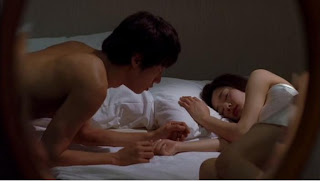When Hideo Nakata released The Ring back in January 1998 and Park Ki-hyeong released Whispering Corridor’s months after, in May 1998, the then stale horror genre was resuscitated with a fresh breathe of life. America had all but bled the slasher revival dry and audiences longed for something different, and these films were just that. Masked knifemen no longer held sway over an audience, but dead women with long, straggly black hair obscuring their face? Guided by some malevolent supernatural force? Time to rejoice! As “shit-your-pants” horror was back!
The success of these movies soon brought with it its imitators: which to this day still proves popular with audiences. However the finest example of the sub-genre wasn’t Hideo Nakata’s first foray, or even Park’s groundbreaking Korean shocker, but the subtle horrors of Nakata’s later effort, Dark Water that encapsulated everything oriental horror was, and should have always been – the perfect mix of being, dramatically, achingly beautiful along with nerve-wrenchingly terrifying.
Taking inspiration once again from Koji Suzuki (ala The Ring) Dark Water tells the story of Yoshimi, a middle-aged mother currently fighting for divorce and in order to maintain custody of her daughter, Ikuko, takes a menial job as a proof-reader. They have also just moved into a run-down apartment block which has more than it’s fare share of maintenance issues; such as the ever growing damp patch in their ceiling which stems from an abandoned apartment above them. Soon, strange occurrences abound and an apparition of a young girl keeps haunting Yoshimi. It transpires that a young girl, Mitsuko, had gone missing in the area the year previous, after she was abandoned by her mother, but why is she targeting Yoshimi and her daughter and how can they stop her?
As much as I loved The Ring upon initial viewing, it’s never drawn me back for repeat viewings. The mystery of the first experience can never be re-lived and as a result repeat viewing can lead to boredom, while waiting for the characters to finally unravel the Sadako mystery and we can enjoy the now legendary finale. Dark Water however, continues to grip and scare the living shit out of us. This isn’t because Mitsuko is the more terrifying creation, Sadako has her beat hands down aesthetically, but her story is more appealing and relatable.
Mitsuko is a tragic creation, born from parental abuse she thrives to claim back what she lost. Whereas Sadako was an enigma, of sorts, in the first Ring movie; murdered by a parental figure and lashing out with a teen-like angst – granted in the book she benefits from the added perversity that’s lacking from the Japanese movie adaptation and suffers for it, however the South Korean version contained this aspect but failed to maintain the scares - and it gives Sadako an air of bratishness as opposed to monster. Dark Water’s Mitsuko however, is a lost child and as such gains or sympathy, which makes it all the more horrifying in that we can understand why she’s still clutching to this world, hoping to find her mother and return home to her.
Though the American re-make has all but tarnished the films name and reputation, I still believe that Dark Water stands head and shoulders over its rival, more successful, genre brethren. It’s one of Japanese horror cinemas finest offerings and as far as the ghostly, dark haired ghost cliché goes, this is the best the Far East has given us. It may not have the body count that horror fans and gorehounds crave, but it’s a film dripping with suspense, leaking with tension and has a fantastic gut-punch finale that will leave its audience affected in a way The Ring and Ju-On franchises could never come close to achieving. You may also find yourself disturbed by Mitsuko’s cold-hearted, calculated determination to claim what she wants, showing a maturity far beyond her young age; leaving you remembering her long after you’ve forgotten Sadako’s pissed at the world, woe is me schoolgirl attitude. This is a special stuff indeed. Highly Recommended!
Dark Water is available to buy on DVD now.









































